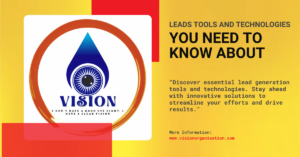Lead Generation Tools and Technologies You Need to Know About:
In today’s competitive business landscape, generating high-quality leads is crucial for driving growth and revenue. Fortunately, there is a wide range of lead generation tools and technologies available to help businesses of all sizes attract, capture, and nurture potential customers.
What is Lead Generation?
Lead generation is the art of transforming strangers and prospects into engaged, interested parties eager to explore your company’s offerings.
This is typically the first step in the sales funnel, as it helps you identify and qualify potential customers.
Effective lead generation involves a variety of strategies and tactics, such as content marketing, search engine optimization (SEO), social media marketing, and the use of lead capture forms and lead magnets. By leveraging the right tools and technologies, businesses can streamline and optimize their lead-generation efforts.
Essential Lead Generation Tools and Technologies:
- Landing Page Builders: Tools like Unbounce, Leadpages, and Instapage allow you to create high-converting landing pages without any coding knowledge. These platforms offer customizable templates, A/B testing capabilities, and integration with other marketing tools.
- Lead Capture Forms: Form builders such as Gravity Forms, Typeform, and HubSpot Forms make it easy to create visually appealing and mobile-responsive lead capture forms. These tools often include features like conditional logic, lead scoring, and CRM integration.
- Lead Magnets: Lead magnets are valuable content offers (e.g., ebooks, whitepapers, webinars) that you can use to incentivize website visitors to provide their contact information. Tools like OptinMonster and Sumo can help you create and promote lead magnets effectively.
- Marketing Automation Platforms: Solutions like HubSpot, Marketo, and Pardot allow you to automate various lead generation and nurturing tasks, such as email campaigns, lead scoring, and lead segmentation. These platforms often include CRM functionality as well.
- Content Management Systems (CMS): A CMS like WordPress, Drupal, or Joomla can serve as the foundation for your lead generation efforts, enabling you to create and publish engaging content that attracts and converts your target audience.
- Search Engine Optimization (SEO) Tools: Tools such as Ahrefs, Semrush, and Google Search Console can help you optimize your website and content for better visibility in search engine results, driving more organic traffic and potential leads.
- Social Media Management: Platforms like Hootsuite, Buffer, and Sprout Social allow you to manage your social media presence, schedule posts, and analyze the performance of your social media lead-generation campaigns.
- Customer Relationship Management (CRM) Systems: CRM tools like Salesforce, Zoho CRM, and HubSpot CRM help you centralize and manage your lead and customer data, enabling you to nurture leads more effectively and track your sales pipeline.
Website Visitor Identification: Solutions like Lead feeder, Clear bit, and Visitor Queue can help you identify the companies and individuals visiting your website, providing valuable insights for your lead generation and sales efforts.
Lead Intelligence and Enrichment: Tools like ZoomInfo, Discoverer, and Lead IQ can enhance your lead data by providing additional information about your leads, such as contact details, firmographic data, and intent signals.


